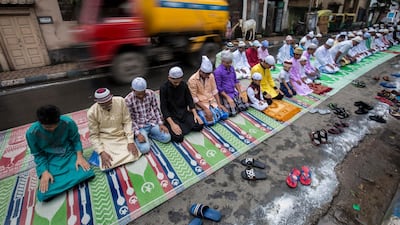In India, where religion pervades every cubic inch of public space, the question of whether Muslims have the right to pray in the open has turned into a contentious debate, stirred up by Hindu nationalist groups and the Bharatiya Janata Party (BJP).
Across the country, Hindu processions routinely tie up traffic, mosques use loudspeakers to call their faithful to prayer, and popular Christian preachers advertise themselves on billboards. Religion isn’t just plainly visible, it’s part of the fabric of daily life.
On Friday, however, right-wing Hindu activists in Gurugram, on the outskirts of Delhi, disrupted at least ten small groups of Muslims offering namaz in the open: by the side of the road, or in a park, or on vacant plots of land. The practice is a common one; Muslims who happen to be out of their homes and away from a mosque during the working day drop to prayer in the nearest convenient spot.
Friday’s string of disruptions was the second such incident in two weeks. On April 20 – also a Friday – a prayer session was interrupted in Wazirabad, in Gurugram. A cell-phone video showed members of the Sanyukt Hindu Sangharsh Samiti, a collective of a dozen Hindu nationalist groups and political parties, instructing a crowd of praying Muslims to rise and disperse from an otherwise-empty square of land.
The Samiti's members shouted Hindu slogans and declared, in Hindi: "No one will offer namaz here."
____________
Read more
Kashmir: Indian forces kill five rebels in clashes
India braced for further sand storms
India: top court concerned about Taj Mahal colour change
____________
After the video went viral, six of the men were arrested. But on Sunday the Samiti’s actions received political support from Manohar Lal Khattar, a senior BJP leader and the chief minister of Haryana, the state in which Gurugram lies. The BJP, the country’s most powerful political party, has close links to Hindu nationalist organisations
Muslims ought to pray in homes or in designated places such as mosques or shrines, Mr Khattar said. “This is not something which should be done in public places.”
The next day, one of Mr Khattar’s ministers, Anil Vij, reinforced the point, suggesting that Muslims were praying on open plots “with the intention of grabbing land… No permission can be granted for this.”
The BJP has drawn sharp political criticism for its stance. Ashok Tanwar, the Haryana chief of the Congress Party, which has traditionally courted India’s minorities, pointed out that, as a matter of routine “religious and social functions are held in public spaces.”
“The chief minister’s statement doesn’t show equal treatment for all,” Mr Tanwar said in a press statement on Monday. “The BJP…always has an agenda of playing with religious sentiments and disturbing communal harmony.”
On Tuesday, D. Suresh, Gurugram’s divisional commissioner and one of the district’s top-ranking bureaucrats, met representatives from the Muslim community and other residents. Mr Suresh had already met representatives of the Samiti on Monday.
Gurugram’s Muslims, represented by the Haryana Wakf Board, said in a letter to Mr Suresh that the region’s fast-growing population included Muslims who had streamed in from other places “to earn their bread and butter.”
Gurugram has very few mosques, the letter pointed out. "Because of this, Muslims have to read Friday namaz in parks and open grounds since there is no space provided for this."
Although Mr Suresh urged the communities to work together to find a solution to their opposing stances, the Samiti has warned that if its demand to halt prayer in public spaces isn't fulfilled, it will continue to disrupt Muslims offering namaz next Friday.
India’s constitution allows the freedom to practice any religion “subject to public order,” but the clause has always been read loosely. Gurugram and Delhi, for example, experience days on end of frozen traffic because of the procession of Kanwariyas – millions of devotees of the deity Shiva who stream through the city every summer
Having drawn holy water from the Ganges river in the foothills of the Himalayas, the Kanwariyas walk with their loads, via Delhi, to various towns in India’s northern plains. As India’s largest annual pilgrimage, it draws around 20 million participants.
Sonal Nerurkar, who lives in the Delhi suburb of Faridabad and has an office in Gurugram, has experienced not only the Kanwariyas but processions taken out by groups from other religions as well.
“On average, I spend more time stuck in traffic within Gurugram than it takes me to travel the distance from Faridabad,” Ms Nerurkar said. “Given how bad the traffic situation is, I think public religious demonstrations of any kind shouldn’t be encouraged.”
She mentioned Hindu wedding processions, in which a groom rides a horse to the wedding venue, backing up traffic for miles. “Why aren’t we objecting to that? It’s unfair to just target one religious community.”

